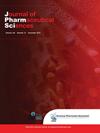Study of leachable compounds in hospital pharmacy-compounded prefilled syringes, infusion bags and vials
IF 3.7
3区 医学
Q2 CHEMISTRY, MEDICINAL
引用次数: 0
Abstract
Hospital pharmacy compoundings are crucial for maintaining patient care. They are time- and cost-effective in hospital pharmacy settings because they prevent waste, preparation errors, dosage errors, microbial contamination and breakage due to handling. Unfortunately, the drawbacks of hospital pharmacy compounding include the selection of inappropriate medical devices (MDs) for long-term storage, which could directly impact patients.
In this study, three important hospital pharmaceutical compoundings, vancomycin in prefilled syringes (PFSs) made of polypropylene (PP) material, paediatric parenteral nutrition (PN) in ethylene vinyl acetate (EVA) bags and diluted insulin in cyclic olefin copolymer (COC) vials, were selected for leachate study and risk assessment. These compounds were studied via a semiquantitative screening approach by means of an ultrahigh-performance liquid chromatography coupled to high-resolution mass spectrometry (UHPLC-HRMS) with postcolumn infusion and an in-house built database. 17 leachable compounds for the PFS, 25 for the PN, and 10 for the vial were identified, and their concentrations were estimated for toxicological assessments.
In conclusion, all MDs used in hospital pharmacy compoundings were observed suitable thanks to risk assessments. However, suitable MDs recommended for long-term storage would remain with polymers like COC, for higher safety when exposed to frail and vulnerable patients like neonates and infants.
医院药房配制的预灌封注射器、输液袋和药瓶中可浸出化合物的研究。
医院药房复方制剂对维持病人护理至关重要。在医院药房环境中,复方制剂既省时又经济,因为它可以防止浪费、制剂错误、剂量错误、微生物污染和因操作造成的破损。遗憾的是,医院药房复方制剂的缺点包括选择不合适的医疗器械(MD)进行长期储存,这可能会直接影响患者。在这项研究中,我们选择了三种重要的医院药剂复方制剂,即用聚丙烯(PP)材料制成的预充式注射器(PFS)中的万古霉素、用乙烯-醋酸乙烯(EVA)袋装的儿科肠外营养品(PN)和用环烯烃共聚物(COC)瓶装的稀释胰岛素,进行浸出物研究和风险评估。通过柱后输液的超高效液相色谱-高分辨质谱法(UHPLC-HRMS)和内部建立的数据库,对这些化合物进行了半定量筛选研究。确定了 PFS 中的 17 种可浸出化合物、PN 中的 25 种可浸出化合物和小瓶中的 10 种可浸出化合物,并估算了它们的浓度,以便进行毒理学评估。总之,根据风险评估,医院药房配制中使用的所有 MD 都是合适的。不过,建议用于长期储存的适当 MD 仍应使用 COC 等聚合物,以便在接触新生儿和婴儿等体弱和易受伤害的患者时具有更高的安全性。
本文章由计算机程序翻译,如有差异,请以英文原文为准。
求助全文
约1分钟内获得全文
求助全文
来源期刊
CiteScore
7.30
自引率
13.20%
发文量
367
审稿时长
33 days
期刊介绍:
The Journal of Pharmaceutical Sciences will publish original research papers, original research notes, invited topical reviews (including Minireviews), and editorial commentary and news. The area of focus shall be concepts in basic pharmaceutical science and such topics as chemical processing of pharmaceuticals, including crystallization, lyophilization, chemical stability of drugs, pharmacokinetics, biopharmaceutics, pharmacodynamics, pro-drug developments, metabolic disposition of bioactive agents, dosage form design, protein-peptide chemistry and biotechnology specifically as these relate to pharmaceutical technology, and targeted drug delivery.

 求助内容:
求助内容: 应助结果提醒方式:
应助结果提醒方式:


